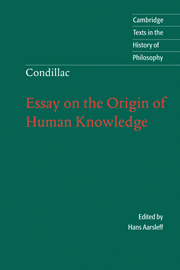Book contents
- Frontmatter
- Contents
- Acknowledgments
- List of abbreviations
- Introduction
- Chronology
- Further reading
- Note on the text and translation
- Essay on the Origin of Human Knowledge
- Introduction
- PART I The materials of our knowledge and especially the operations of the soul
- PART II Language and method
- Index
- Cambridge texts in the history of philosophy
Introduction
Published online by Cambridge University Press: 05 June 2012
- Frontmatter
- Contents
- Acknowledgments
- List of abbreviations
- Introduction
- Chronology
- Further reading
- Note on the text and translation
- Essay on the Origin of Human Knowledge
- Introduction
- PART I The materials of our knowledge and especially the operations of the soul
- PART II Language and method
- Index
- Cambridge texts in the history of philosophy
Summary
In the introduction to Origin, Condillac explains that his entire argument hinges on two notions: the connection of ideas and the language of action. About the former he believed that it is a fact of experience that the world, both natural and social, is a concatenation of things and events. Of these we may form ideas in the mind, but the world will still remain foreign to us unless we have some way of gaining mastery over ideas so that we can connect them at will to form discursive thinking; knowledge is not possible without the power of recall. Fortunately, ideas connect with signs, “and it is, as I will show, only by this means that they connect among themselves,” namely in our minds, in which signs constitute a particular kind of ideas. Thus the connection of ideas is a way of rebuilding, as it were, as much of the world as we can by bringing the outside under inside control. On its first publication Origin carried the subtitle “a work in which all that pertains to the human understanding is reduced to a single principle.” The introduction makes it clear that this principle is the connection of ideas.
Having assigned this crucial role to signs, Condillac next admitted that he was obliged to show how we have acquired the habit of using signs and gained the aptitude to employ them. He would need to give an account of the origin of speech, and here also he began from the outside with what he called the language of action.
- Type
- Chapter
- Information
- Condillac: Essay on the Origin of Human Knowledge , pp. xi - xxxviiiPublisher: Cambridge University PressPrint publication year: 2001

